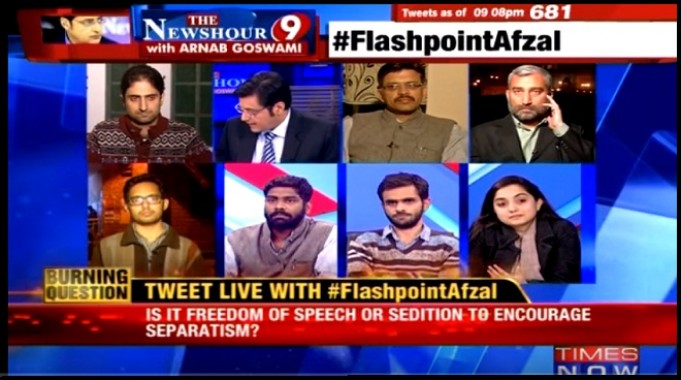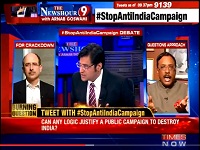Arnab Goswami constructs moral panic
The sociologist and criminologist Stanley Cohen theorized about intimidation through the construction of folk devils and moral panic. That is, media targeting of a group of people, mostly from the minorities, as folk devils saying they are threat to the society. Even Hitler used it to wipe out the Jews from Germany.
Moral panic has immense impact on the collective conscience of society. Sometimes Arnab Goswami’s The Newshour Debates contribute to construct moral panic in Indian society. The latest episode of the programme (Feb 10, 2016) titled as ‘Tribute To Afzal Guru at JNU-Students Crossed All Lines?’ is apparently an attempt in this category. His debate was a one-man show. No other side of the coin got space. For almost 85% of the programme he barked himself without giving a chance to others. He behaved as a quasi-journalist and a spokesperson of BJP. The invitees Nupur Sharma (BJP leader), Prafulla Ketkar (Editor, Organiser) Sushil Pandit (Activist), Junaid Mattu (Spokesperson of National Conference, the channel spelt his name wrong), Umar Khalid (Student Activist from JNU), Ishan Anand (Secretary of Democratic Students' Federation, JNU) and Lenin Kumar (Former Student Union President) became a mere audience to his public speaking.
More than the show’s failure to allow multi-dimensional views, it made some dangerous inferences. Goswami termed the JNU event as anti-national and he wondered who was funding them. He saw in the ‘cultural event’ some terrorist elements. This is an example of victimising some for what they are not. The organizers might be blameless, but were not allowed a say. If a democracy’s media do not allow differences of opinions it narrows the gap between oligarchy and democracy.
Comments on YouTube
The comments appearing on the YouTube page under this episode validate the term moral panic. Till 15th Feb, 2016, there were 6420 comments on it. It became a place to malign the opponents. Importantly, religious, regional and racial attacks came forth. Comments demonstrated how an Indian mind thinks and how media impacts on a globalized crowd.
The first and foremost theme for comments is religion. The YouTube page was converted into a battlefield of religious sentiments. Approximately 45% percent of the views were against Islam. In fact it became as pace to malign the other religion which one opposes. Massive attacks on Islam happened because of the religion being represented by two Muslim names in the TV episode and they were from JNU. One social media user, asked,“God why you gave birth to a religion like Islam?” This comment attracted more than one hundred replys.
Racial comments are so common in social media. Goswami provided one more opportunity for it. One viewer named as Avid Reader commented that “LENIN (one of the invitees) LOOKS LIKE A BUFFALO”. Another added, “fat pig and anti-national”. And so on, and on, and on.
The repetition of Pakistan among these comments makes us to think that JNU issue is something that related to Pakistan like a terror attack on our premises by Pakistan. One of the JNU students laments, “I’m equally saddened at the reaction of Indians to this. Just because there were may be 30 people who said these slogans, suddenly on social media people say shut down JNU, all JNU students should be sent to Pakistan etc. As a JNU student who is studying in JNU currently it really irritates me.”
Indian media, especially the prime time debates, build an environment for creating moral panic. It is dangerous for a democracy to tag a minority as anti-national or terrorists whether it is JNU students or Muslims. When opinion is offered as facts, one has to ask,what sort of journalism is it leading to?
Musthafa Mubashir is a research scholar, Department of Electronic Media and Mass Communication, Pondicherry University.








